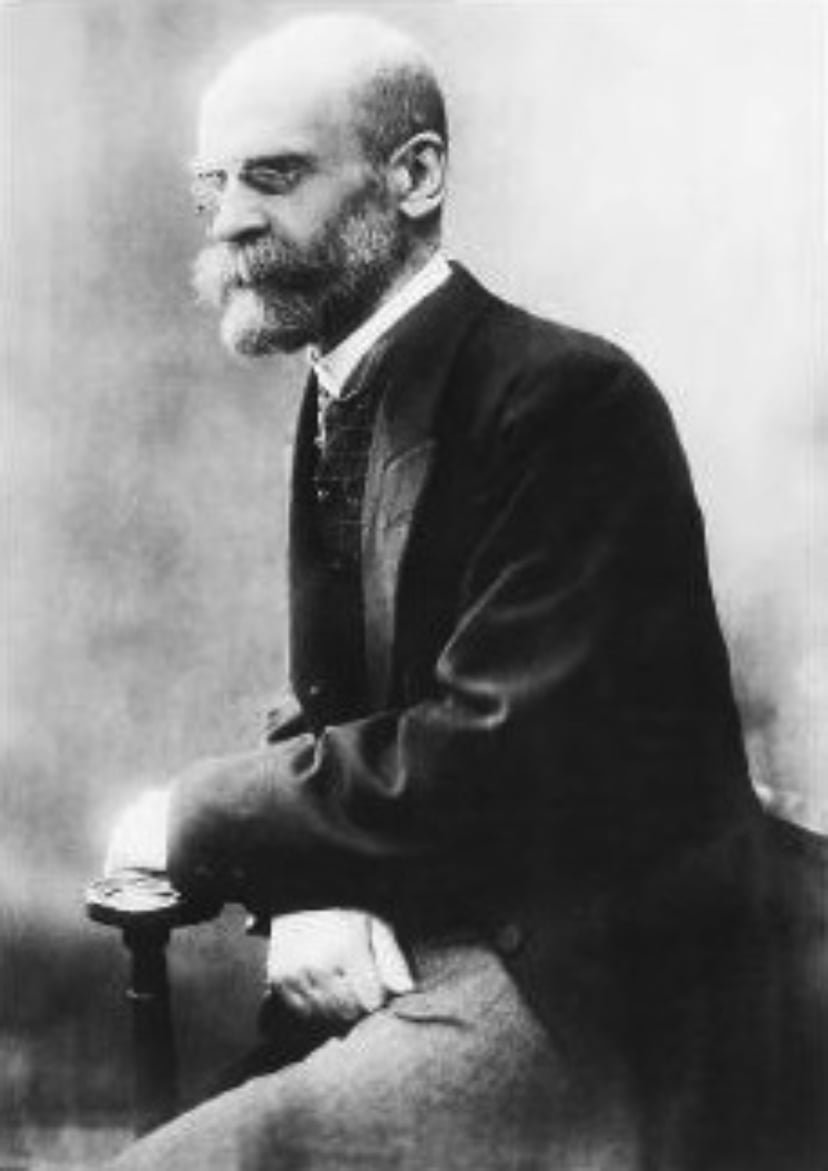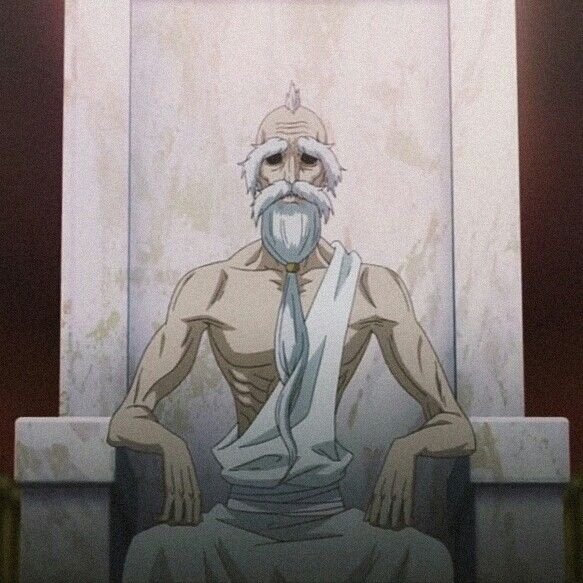

Zeus

|
ゼウス
|
|
|---|---|
| Personal Description | |
| Nihongo | ゼウス |
| Vital Information | |
| Gender | Male |
| Age | Eons |
| Species | God |
| Origin | Unknown (Heaven, possibly) |
| Status | Alive |
| First Appearance | |
| Manga Debut | Chapter 1 |
| Anime Debut | Episode 1 |
| Japanese Voice | Wataru Takagi |
| English Voice | Chris Edgerly |
Zeusis the Gods’ representative in the second round of Ragnarok, where he facesAdam, the progenitor of humanity. As a central figure in the Greek Pantheon, Zeus is not only the supreme deity of his pantheon but also the chairman of theGods’ Council, responsible for leading the divine assembly and selecting the gods’ fighters in the tournament. Known as the“God Father of the Cosmos”(全宇宙の父ゴッドファーザー・オブ・コスモス, Goddofāzā ofu Kosumosu), Zeus embodies unparalleled authority and strength among the gods.
|
Émile Durkheim
|
|
|---|---|
| Born |
David Émile Durkheim
15 April 1858 Épinal, France
|
| Died | 15 November 1917(aged 59)
Paris,France
|
| Nationality | French |
| Alma mater | École Normale Supérieure |
| Known for | Sacred–profane dichotomy Collective consciousness Social fact Social integration Anomie Collective effervescence |
| Scientific career | |
| Fields | Philosophy, sociology, education, anthropology, religious studies |
| Institutions | University of Paris, University of Bordeaux |
| Influences | Immanuel Kant, René Descartes,Plato, Herbert Spencer,Aristotle, Montesquieu, Jean-Jacques Rousseau, Auguste Comte. William James, John Dewey, Fustel de Coulanges, Jean-Marie Guyau, Charles Bernard Renouvier, John Stuart Mill |
| Influenced | Marcel Mauss,Claude Lévi-Strauss, Talcott Parsons, Maurice Halbwachs, Jonathan Haidt, Lucien Lévy-Bruhl,Bronisław Malinowski, Fernand Braudel, Pierre Bourdieu, Charles Taylor, Henri Bergson, Emmanuel Levinas, Steven Lukes, Alfred Radcliffe-Brown, E. E. Evans-Pritchard, Mary Douglas, Paul Fauconnet, Robert N. Bellah, Ziya Gökalp, David Bloor, Randall Collins, Neil Smelser[1] |
Appearance
Zeus is depicted as a wiry, elderly figure with a deceptively frail appearance that belies his immense power. His small stature and wrinkled skin often lead opponents to underestimate him, but his body transforms dramatically during combat. When fighting, Zeus’s muscles swell to massive proportions, exuding raw power and godly energy. His piercing eyes and confident smirk reflect his arrogance and absolute belief in his superiority as a god.

Zeus, the king of the Greek gods, seated on his majestic throne atop Mount Olympus. Depicted with his lightning bolt and regal demeanor, Zeus symbolizes authority, power, and justice in Greek mythology.
Abilities
As the King of the Greek Pantheon and the “God Father of the Cosmos,” Zeus wields overwhelming power, unmatched combat skills, and unshakable confidence. His abilities define him as one of the most dangerous opponents in the Ragnarok tournament.
- Fist That Surpasses Time (時を超える拳, Toki o Koeru Ken): Zeus’s ultimate technique allows him to unleash punches faster than the speed of time itself, making it nearly impossible for opponents to anticipate or evade his attacks.
- Adamas Mode (アダマスモード, Adamasu Mōdo): By channeling his divine essence, Zeus enters a heightened state of power, where his body becomes a manifestation of pure might and resilience. This form amplifies his strength and endurance to godly extremes.
- Combat Mastery: Zeus is a seasoned warrior with millennia of experience. His fighting style blends raw strength, unorthodox movements, and strategic cunning, making him unpredictable and lethal in battle.
- Supreme Authority: As the chairman of the Gods’ Council, Zeus’s decisions carry ultimate weight. His role as a leader reflects his dominance not only in strength but also in his ability to command respect from other gods.
Background
In Greek mythology and Record of Ragnarok, Zeus is the King of the Greek Pantheon, revered as the ruler of Olympus and the cosmos. He ascended to power after overthrowing his father, Cronus, in a monumental battle known as the Titanomachy. This victory solidified his position as the supreme deity.
Role in the Story
Zeus’s role in the series demonstrates his pivotal influence over the tournament and his unyielding belief in the gods’ dominion over humanity.
- Battle Against Adam: Zeus volunteers to fight Adam in the second round, considering it an honor to face humanity’s progenitor. The clash between the two titans is a spectacle of strength, strategy, and resilience, showcasing Zeus’s ultimate technique, the “Fist That Surpasses Time.” The fight is as much a physical con as it is a philosophical battle over the worth of humanity.
- Leader of the Gods’ Fighters: Zeus’s position as chairman of the Gods’ Council places him at the forefront of Ragnarok’s organization. He selects the gods’ representatives for each round, ensuring their side remains dominant.
Relationships
Hades and Poseidon
As his brothers, Zeus shares a deep bond with these other Olympian rulers. Despite occasional differences, their combined strength underpins the power of the Greek Pantheon.
Adam
Zeus regards Adam as a fascinating opponent, representing humanity’s potential and defiance. Their fight symbolizes the eternal struggle between creation and creator.
Other Gods
As the leader of the Gods’ Council, Zeus commands the respect and loyalty of deities from all pantheons, though his arrogance occasionally sparks tension among his peers.
Trivia and Insights
- “God Father of the Cosmos”: Zeus’s nickname emphasizes his role as the ultimate authority among the gods. The abbreviationGFOChas become a popular moniker among fans of the series.
- Unpredictable Fighter: Despite his arrogant demeanor, Zeus is a master strategist, often baiting his opponents into underestimating him before unleashing devastating attacks.
- Symbol of Divine Authority: Zeus’s character embodies the gods’ belief in their inherent superiority over humanity, making him a central figure in the philosophical themes of the series.
Legacy and Impact
Zeus’s role in Record of Ragnarok cements his position as one of the series’ most formidable characters. His fight with Adam is a defining moment, showcasing the philosophical and physical stakes of Ragnarok. As both a warrior and leader, Zeus symbolizes the gods’ struggle to maintain their dominance over humanity, making him a compelling and multi-dimensional antagonist.